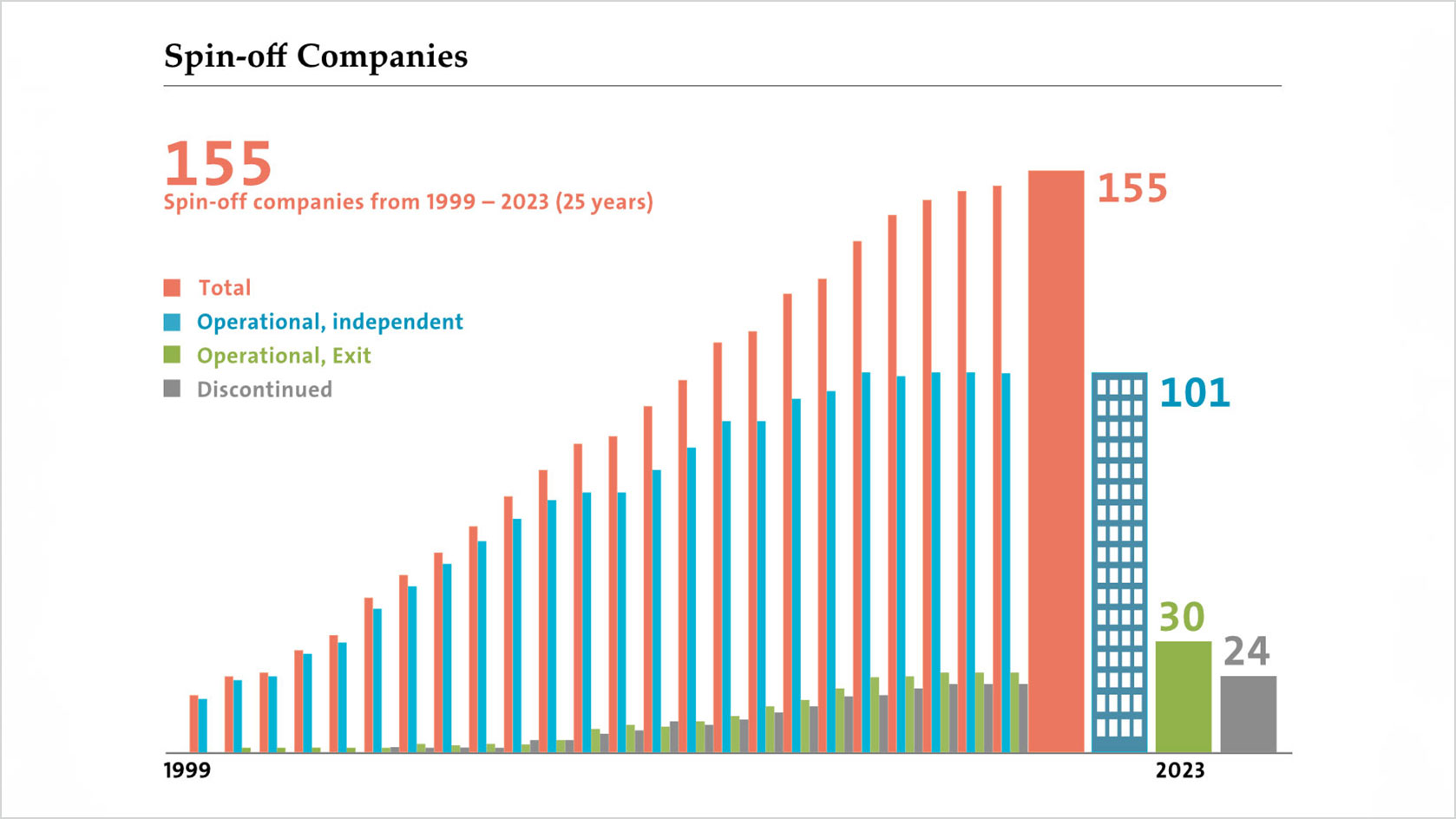From Lab to Market
Every year, talented students and researchers from the University of Zurich set up their own companies and bring innovative business concepts to life. Last year, eight teams signed a license agreement with UZH to commercially develop new methods and technologies based on research findings in the areas of medicine, dentistry, chemistry and mathematics.
Better oral health
Digital scanning technologies, which make it possible to measure teeth and the interior of the mouth with high precision using optical cameras, are becoming increasingly common in dental practices. In addition to providing measurements for dental prostheses, these scan data open up a wide range of diagnostic possibilities. The spin-off Dentexion is developing a software platform that enables dentists to analyze 3D data from patients mouths and evaluate changes over time. The technology, developed at the Computer-Assisted Restorative Dentistry Department, uses AI to analyze 3D scans of components such as teeth, gums and bone in order to detect and document pathological changes at an early stage, which is particularly helpful in cases of tooth tissue loss or inflammation.
Dentexion GmbH
Hope for lead poisoning
Food, tap water or even air particles can be contaminated with lead, which poses serious health risks. Even small amounts of the heavy metal can lead to kidney damage, anemia, high blood pressure, cardiovascular failure and cognitive and neurological impairments.
There are currently only two drugs available to treat severe lead poisoning, and over 90 percent of diagnosed cases are left untreated. Chemist Michal Shoshan aims to change this situation with her spin-off metaLead Therapeutics AG. She and her team at the Department of Chemistry have developed novel short peptides that do not have the disadvantages of conventional therapies. They have synthesized around 50 peptides, eight of which show promising properties. The leading substance so far, which has been tested in animal models, has been found to significantly reduce lead levels in the blood, brain and liver without impairing essential metal concentrations.
metaLead Therapeutics AG
New immunotherapies to combat cancer
The spin-off ATLyphe AG is developing antibodies to stimulate immune cells that could be used to treat blood stem cell diseases in the future. The current main project focuses on an antibody that activates T-cells to fight acute myeloid leukemia. Due to the structural similarities between diseased leukemia cells and healthy blood stem cells, this biospecific antibody could also be used in the future in advance of transplants of foreign or genetically corrected hematopoietic stem cells. This would be a promising treatment option not only for patients with acute myeloid leukemia, but also for patients with other leukemias and congenital blood disorders. The safety and efficacy of the therapy in people with acute myeloid leukemia will soon be tested in a phase I study. ATLyphe’s work is based on research findings from UZH and ETH Zurich. The company is headed by Markus Manz, professor of hematology and director of the Department of Medical Oncology and Hematology at the University Hospital Zurich, and Dario Neri, professor at ETH Zurich.
ATLyphe AG
New treatment for endometriosis
The spin-off FimmCyte is researching a new treatment for endometriosis, a disease in which endometrium-like cells grow outside the uterus. Endometriosis often causes severe and chronic pain, affecting an estimated 10 percent of women of childbearing age worldwide. Instead of the usual hormone treatments or operations, FimmCyte is developing an antibody therapy. The antibodies developed by the company are able to recognize a specific protein that is present to excess in endometriosis cells, thus making it possible to treat the affected tissue directly.
The scientific discovery comes from the laboratory of Brigitte Leeners, UZH professor of gynecological endocrinology and reproductive medicine. Two junior researchers in Leeners’ team, Valentina Vongrad and Mohaned Shilaih, discovered this specific protein over-expression and developed the antibody therapy as a result. The treatment is currently in the test phase.
FimmCyte
Innovative treatment approach for autoimmune diseases
Seito Biologics AG is developing a new immunotherapy for autoimmune diseases such as type-1 diabetes, multiple sclerosis, rheumatoid arthritis and systemic lupus erythematosus. Unlike conventional treatments, which suppress the immune system and thus increase the risk of infection and cancer, the spin-off is focussed on therapies that regulate the immune system. The researchers are working with Treg cell engagers with the aim of improving the efficacy of regulators T cells, or “Treg” cells. Treg cells help to keep the immune system in check by preventing excessive or misdirected immune reactions. The innovative therapy improves both the function and the number of these Treg cells, thereby stablizing the immune system and preventing it from mistakenly turning against its own body, as happens in autoimmune diseases. The promising treatment approach is based on research conducted at the UZH chair of clinical immunology and allergology.
Seito Biologics AG
Simpler analysis of satellite data

Although geospatial data from satellites has been collected for half a century, transforming it into usable information remains a challenge. Currently, such data are mainly analyzed by experts. The spin-off askEarth is dedicated to preparing the comprehensive data in such a way that non-experts are also able to use them to aid decision-making in areas such as environmental management, town planning and resource management. To this end, the company has developed a user interface that makes complex geodata accessible in real time. AskEarth co-founder Simon Grüning is an alumnus of UZH and received support from the Entrepreneur Fellowship Program (see box). The fellowship enabled him to develop his spin-off idea to market readiness.
askEarth
New ways to stabilize the spine
Although spinal surgery is effective in many cases, there is room for improvement to reduce the rate of complications and increase clinical success. While a majority of the medtech sector concentrates on spinal fusion, innovative approaches to circumventing such interventions have so far remained limited. The spin-off MovingSpine AG is therefore working on developing and testing alternative treatments. One key project is the optimization of the vertebropexy, a process that stabilizes spinal segments by weaving in ligaments and textiles without causing the spine to stiffen. This innovative approach is based on the research work done at the University Center for Spinal Surgery Zurich at Balgrist University Hospital.
Real-time assisted surgical navigation
Surgical navigation systems are used to perform critical steps in operations with precision. However, the systems also have disadvantages, such as a complicated surgical procedure, an extended operating time and dependence on invasive imaging. Surgical navigation has therefore not yet become standard practice in surgical interventions. The spin-off X23D AG addresses this challenge by developing systems for computer-assisted surgical navigation that can be seamlessly integrated into procedures. The company has designed innovative AI algorithms that collect data directly during a spinal surgery procedure and can display the necessary information in real time. Surgeons thus gain a precise 3D view of the spine, enabling them to carry out the surgery with high precision. The development of this surgical navigation system is based on the research of Philipp Fürnstahl, UZH professor of orthopedic computer sciences at Balgrist University Hospital, and his colleague Hooman Esfandiari.
Remarkable successes
A total of 155 spin-offs have been founded at UZH since 1999, of which 131 (84%) are still active. This is a remarkable percentage considering that according to current statistics from the Federal Statistical Office, the survival rate of newly founded companies in Switzerland is only around 50% after five years. 2023 was a particularly successful year for several UZH spin-offs.
- Navignostics received an Innosuisse grant of just under CHF 2.4 million. The spin-off founded in 2022 develops innovative diagnostic methods to analyze tumor samples.
- InCephalo received a grant of 2.3 million euros from the “Eurostars” European funding program. This funding will enable the company to further develop its technology platform which helps in the treatment of brain tumors.
- The biotech start-up EraCal Therapeutics Ltd. entered into a research cooperation agreement with Nestlé Health Science, with the aim of identifying novel nutraceuticals to control food intake.
- The UZH spin-offs askEarth and Prometheus Life Technologies have been selected to join the Swiss Space Incubator ESA BIC Switzerland. The incubator supports Swiss space-related high-tech startups by providing technical, business and financial assistance as well as networking and community-building opportunities.
- For Cutiss, a UZH spin-off that develops customized skin grafts, 2023 was an extremely successful year: in March, Cutiss researchers conducted an experiment aboard the International Space Station to investigate skin-cell regeneration. The findings of the clinical phase 2 study proved that the company’s skin product “denovoSkin” is highly effective. Cutiss has been granted CHF 2.5 million in funding from Innosuisse to develop the pioneering program.
- Another UZH spin-off, IniVation, is cooperating with ETH Zurich to integrate its innovative high-speed eye sensors into VR and AR glasses.
This article was amended on 5 March 2024.

